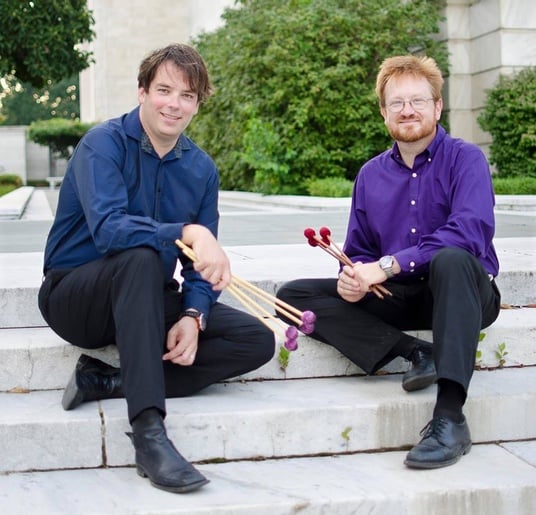by Jarrett Hoffman

At noon, head to the Church of the Covenant in Cleveland or go online to hear a free program by organist Christa Rakich, who will play selections from J.S. Bach’s Art of Fugue (program details here, streaming link here).
The hour of 7:30 pm brings two in-person options. One is in Elyria, where Duo Anime — percussionists Andrew Pongracz and Mell Csicsila, pictured — will be featured on the LCCC Signature Series at Cirigliano Studio Theatre in the Stocker Center for the Arts. It’s free, and you can survey the program here.
The other is in Akron, where violinist Joshua Bell and soprano Larisa Martinez will be joined by pianist Peter Dugan in “Voice and the Violin” on the Tuesday Musical series. Check out the program, read Mike Telin’s preview article, then shop for tickets.
IN THE NEWS:
The virtual learning platform Oberlin Conservatory Global, aimed at “lifelong learners of all ages,” begins its second year with courses on music appreciation, historical performance, and self-employment in the arts. Read Erich Burnett’s story here.
Finalists have been named for this year’s iteration of the Canton Symphony’s Art and Music Educator Awards. On the music side, two nominees each come from North Canton City Schools (Ron Varn and Sonya Ash) and Plain Local Schools (Mary Meese and Jessica Bell), while Perry Local Schools will be represented by Beth Polen. Winners will be announced during the “Celebration of the CSO” program on March 5.
And CityMusic Cleveland’s February 27 program, “Transcendence,” is notable not only for a new commission from Jungyoon Wie, but also a performance of Olivier Messiaen’s Quartet for the End of Time featuring choreography by David Shimotakahara of GroundWorks Dance Theater. Interest piqued? Steve Sucato talks to Shimotakahara about the project here.
INTERESTING READS:
Speaking of choreography, The New York Times’ latest article in the “5 Minutes That Will Make You Love ____” series focuses on music for dance. The contributors — a sampling of writers, dancers, choreographers, teachers, and directors — touch on many different styles, from reggae to house, step, ballet, tap, and jazz. Read here.
And pianist Lara Downes has written a piece for NPR about the legacy of Scott Joplin, in particular The Entertainer. The article concludes with a playlist of various interpretations of the piece, from “old-school violin elegance” to “piano jazz virtuosity,” “a lilting folk treatment,” and more experimental versions in the realms of reggae and bluegrass. Plus, continuing today’s theme of music and dance, the editors have also included historical photos showcasing a variety of dances inspired by 20th-century music. Read here.
TODAY’S ALMANAC:
On this date last year, we featured a trio of American musicians: composers Margaret Brouwer (who turns 82 today) and John Williams (turns 90), and conductor James DePreist (died on February 8, 2013). This time, we’ll turn to a notable premiere: that of Jean Sibelius’ Violin Concerto.
The first performance — which took place on this date in 1904 in Helsinki, when Victor Nováček played the solo part and Sibelius conducted the Orchestra of Helsinki Philharmonic Society — has been variously characterized as “dismal” and “a disaster.”
There are a few possible reasons, beginning with the fact that Sibelius (above) only turned to Nováček after the original dedicatee, violinist Willy Burmester, was unable to travel to Finland — Sibelius’ own fault, as he changed course from the original plan of performing it in Berlin.
Was Nováček the lesser player? Did the composer finish it so late that it couldn’t be properly learned in time? Both of those are probably true, and the result, as Sibelius biographer Erik Tawaststjerna writes, is that poor Nováček was “red-faced and perspiring” as he “fought a losing battle.”
It doesn’t help that this original version of the concerto was not only longer, but also significantly more difficult than the revised version (1905) that is almost exclusively heard today. Only on a few occasions have Sibelius’ heirs granted permission for the original to be performed, and Leonidas Kavakos is one of the rare soloists to have taken on both of them.
Listen to Kavakos play the original in 1991 with Osmo Vänskä and the Lahti Symphony Orchestra here, then hear him perform the revised version in a live performance from 2012 with Valery Gergiev and the Mariinsky Theatre Orchestra here.



